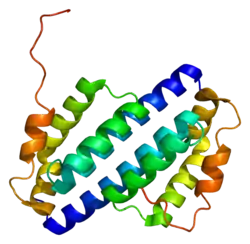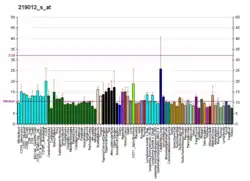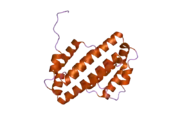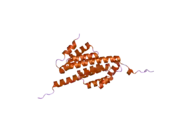EMSY
EMSY is a protein that in humans is encoded by the EMSY gene.[5]
Clinical significance
EMSY has been shown to associate with atopy and susceptibility to poly-sensitisation.[6]
References
- GRCh38: Ensembl release 89: ENSG00000158636 - Ensembl, May 2017
- GRCm38: Ensembl release 89: ENSMUSG00000035401 - Ensembl, May 2017
- "Human PubMed Reference:". National Center for Biotechnology Information, U.S. National Library of Medicine.
- "Mouse PubMed Reference:". National Center for Biotechnology Information, U.S. National Library of Medicine.
- "Entrez Gene: C11orf30 chromosome 11 open reading frame 30".
- Amaral, A. F. S.; Minelli, C.; Guerra, S.; Wjst, M.; Probst-Hensch, N.; Pin, I.; Svanes, C.; Janson, C.; Heinrich, J.; Jarvis, D. L. (March 2015). "The locus C11orf30 increases susceptibility to poly-sensitization". Allergy. 70 (3): 328–333. doi:10.1111/all.12557. hdl:10044/1/21574. PMID 25546184. S2CID 25960081.
- Hughes-Davies L, Huntsman D, Ruas M, Fuks F, Bye J, Chin SF, Milner J, Brown LA, Hsu F, Gilks B, Nielsen T, Schulzer M, Chia S, Ragaz J, Cahn A, Linger L, Ozdag H, Cattaneo E, Jordanova ES, Schuuring E, Yu DS, Venkitaraman A, Ponder B, Doherty A, Aparicio S, Bentley D, Theillet C, Ponting CP, Caldas C, Kouzarides T (Nov 2003). "EMSY links the BRCA2 pathway to sporadic breast and ovarian cancer". Cell. 115 (5): 523–35. doi:10.1016/S0092-8674(03)00930-9. PMID 14651845. S2CID 18911371.
External links
- Human C11orf30 genome location and C11orf30 gene details page in the UCSC Genome Browser.
Further reading
- Hughes-Davies L, Huntsman D, Ruas M, Fuks F, Bye J, Chin SF, Milner J, Brown LA, Hsu F, Gilks B, Nielsen T, Schulzer M, Chia S, Ragaz J, Cahn A, Linger L, Ozdag H, Cattaneo E, Jordanova ES, Schuuring E, Yu DS, Venkitaraman A, Ponder B, Doherty A, Aparicio S, Bentley D, Theillet C, Ponting CP, Caldas C, Kouzarides T (2003). "EMSY links the BRCA2 pathway to sporadic breast and ovarian cancer". Cell. 115 (5): 523–35. doi:10.1016/S0092-8674(03)00930-9. PMID 14651845. S2CID 18911371.
- Bera TK, Das S, Maeda H, Beers R, Wolfgang CD, Kumar V, Hahn Y, Lee B, Pastan I (2004). "NGEP, a gene encoding a membrane protein detected only in prostate cancer and normal prostate". Proc. Natl. Acad. Sci. U.S.A. 101 (9): 3059–64. doi:10.1073/pnas.0308746101. PMC 365744. PMID 14981236.
- Beausoleil SA, Jedrychowski M, Schwartz D, Elias JE, Villén J, Li J, Cohn MA, Cantley LC, Gygi SP (2004). "Large-scale characterization of HeLa cell nuclear phosphoproteins". Proc. Natl. Acad. Sci. U.S.A. 101 (33): 12130–5. doi:10.1073/pnas.0404720101. PMC 514446. PMID 15302935.
- Ekblad CM, Chavali GB, Basu BP, Freund SM, Veprintsev D, Hughes-Davies L, Kouzarides T, Doherty AJ, Itzhaki LS (2005). "Binding of EMSY to HP1beta: implications for recruitment of HP1beta and BS69". EMBO Rep. 6 (7): 675–80. doi:10.1038/sj.embor.7400415. PMC 1369107. PMID 15947784.
- Chavali GB, Ekblad CM, Basu BP, Brissett NC, Veprintsev D, Hughes-Davies L, Kouzarides T, Itzhaki LS, Doherty AJ (2005). "Crystal structure of the ENT domain of human EMSY". J. Mol. Biol. 350 (5): 964–73. doi:10.1016/j.jmb.2005.05.047. PMID 15978617.
- Benusiglio PR, Lesueur F, Luccarini C, McIntosh J, Luben RN, Smith P, Dunning A, Easton DF, Ponder BA, Pharoah PD (2005). "Common variation in EMSY and risk of breast and ovarian cancer: a case-control study using HapMap tagging SNPs". BMC Cancer. 5: 81. doi:10.1186/1471-2407-5-81. PMC 1185523. PMID 16029503.
- Raouf A, Brown L, Vrcelj N, To K, Kwok W, Huntsman D, Eaves CJ (2005). "Genomic instability of human mammary epithelial cells overexpressing a truncated form of EMSY". J. Natl. Cancer Inst. 97 (17): 1302–6. doi:10.1093/jnci/dji254. PMID 16145051.
- Brown LA, Irving J, Parker R, Kim H, Press JZ, Longacre TA, Chia S, Magliocco A, Makretsov N, Gilks B, Pollack J, Huntsman D (2006). "Amplification of EMSY, a novel oncogene on 11q13, in high grade ovarian surface epithelial carcinomas". Gynecol. Oncol. 100 (2): 264–70. doi:10.1016/j.ygyno.2005.08.026. PMID 16236351.
- Huang Y, Myers MP, Xu RM (2006). "Crystal structure of the HP1-EMSY complex reveals an unusual mode of HP1 binding". Structure. 14 (4): 703–12. doi:10.1016/j.str.2006.01.007. PMID 16615912.
This article is issued from Wikipedia. The text is licensed under Creative Commons - Attribution - Sharealike. Additional terms may apply for the media files.








